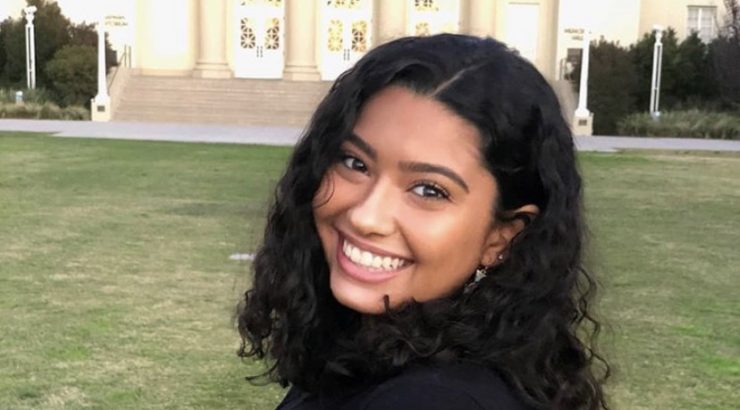
Juneteenth, the American Dream and Revolutionary Love Reflection by Mona Asadi '22
June 18, 2020
When I “passed the mic” to Mona Asadi ’22 to write a blog to the Chapman community this week, and received this essay from her, I was overwhelmed – so beautifully written, personal, and challenging. Please read – truly worth a few moments of your time! ~ Gail Stearns, Dean, Wallace All Faiths Chapel
As Juneteenth arrives this weekend, so comes the celebration of the end of American slavery. On June 19th, 1865, more than two and a half years after the issuing of the Emancipation Proclamation, Major General Gordon Granger rode into Galveston, Texas, and told the last black men, women and children of slave status that they were, in fact, free.
Juneteenth holds a special significance to me, as it does for many other Americans. Allow me to introduce myself. My name is Mona Asadi and I am a rising junior at Chapman University, double majoring in Music Education and Vocal Performance and with a minor in Religious Studies. As we all do, I call myself by many different names — a musician, a future educator, a Baha’i and a biracial, first-generation American.
My Story
My mother grew up in Trinidad, a small island-nation at the bottom of the Caribbean chain. She is the descendant of the native Caribs and the Africans brought to the island in the slave trade, both of which suffered for generations under the oppression of indentured servitude and slavery. Although her parents tried to give her and their four other children the best, my mother always felt that there was something more waiting for her. She immigrated to America in her early twenties, working her first American job with her dark skin, afro hair and funny Caribbean accent.
In a land almost unimaginably different, my father grew up in a small farming village in northern Iran. He also immigrated here in his early twenties, only three short years before the Iranian Revolution. In a country where he spoke no English and had no money or family, he had to watch from across the world as his country was ripped to shreds by the monstrosities of political extremism and religious fanaticism. Baha’is, the largest religious minority in Iran, became the scapegoats of this revolution, which initiated a de facto genocide that is still suffered by the Baha’is of Iran to this day. My father could do nothing as his family and many others became the victims of hate crimes. His family’s land was seized from them, the fruit trees and crops of their large farm destroyed, their hand-built family home burnt, and their farm animals set ablaze. Wealth was no more, safety was no more, home was no more, and my father was alone in America with his grief, trying to make the most of the American dream.
Fast-forward in time to my birth nearly twenty years ago. My reality was very different from that of my parents; I didn’t have to worry about moving to a new country and working from the ground up. Although I was not privileged by any means, I was blessed with an education on love from my parents and my faith that shaped me into who I am today. As many brown and black children in America can relate to, I grew up having to define and navigate my own identity much too soon. My brown skin and ambiguous features were different in a way that others could not make sense of.
Everywhere I turned, I had to explain who I was. “What’s a Baha’i?” they’d ask. I’d try my best to sum up an entire faith in a sentence or two. “What race are you?” or sometimes, “Where are you from?” they’d inquire. “I’m half black, half middle eastern, but I’m from here,” I’d reply. “You don’t look black though!” they’d cry. I wouldn’t know what to say — I knew that I was. “Middle Eastern!” they’d sometimes exclaim, “Terrorist!!” They’d all run away screaming, in laughter or fear I was always unsure.
The American Dream and Oppression
As I got older my eyes were opened even further. I learned about white supremacy, racism, and the thinly veiled fear and disgust that my family’s accents and skin colors brought out in others around us. It wasn’t until college, however, where I finally started to understand the grinding inner-gears of the system of oppression that fuels America. Educating myself allowed me to think back to the generations before me and their suffering.
Although my ancestors were taken as slaves to the Caribbean instead of to America, remembering Juneteenth reminds me of their own resilience and the blood that flows through my veins. I then I think back to my father, and the Persian family I barely know spread all over the globe, pushed out of Iran with the biting beast of religious persecution nipping at their necks. I think about the fear they must have felt, and how especially painful it must have been for my father. I think about the oppression both my parents felt, in their homelands and in America, the oppression I’ve felt, and the oppression that the African American community is feeling now and has felt for hundreds of years. I feel the pain, and I scoff at the very idea of the American dream.
The American dream is, by its very definition, a fallacy. According to Investopedia,
“The American Dream is the belief that anyone, regardless of where they were born or what class they were born into, can attain their own version of success in a society where upward mobility is possible for everyone. The American Dream is achieved through sacrifice, risk-taking, and hard work, rather than by chance.” The American dream claims that no matter what their background, anyone in America can put in the hard work and achieve their dreams.
After the end of slavery in America, African Americans were left to their own devices. Reconstruction was a failure and slave labor was substituted with sharecropping. Many moved away from the South, but the North was hardly better, and Jim Crow laws became standard everywhere in America. Just like my mother and father fled oppression in hope for a better life, so did the recently freed African Americans. There was no blueprint, and America failed them.
According to Inequality.org, the median black family in America owns just 2% of that of the median white family. On average, a white family in America owns 41x the wealth of that of a black family. We all know that this isn’t because of a lack of “sacrifice, risk-taking, and hard work.” The African American and immigrant communities face continual disenfranchisement and prejudice, believing in an America that does not believe in them.
More than that, the American dream claims that luck should have little to do with success as long as the hard work has been put in. What was it but a stroke of luck that my parents received their green cards, which is a very long and grueling process, at the time in which they did? What was it but a stroke of luck for the slaves that Lincoln signed the Emancipation Proclamation when he realized that ending slavery was the only real card he had left to play in the war against the South? What is it but a stroke of luck that an inner-city kid gets a chance to go to a school like Chapman and leave the fear and violence of their home behind? What is it but a stroke of luck that one black man gets stopped by the police and is let go, while the other is shot and killed? No – luck has everything to do with achieving the American Dream.
Oppression is a constant. It surrounds us, whether we acknowledge it or not, whether we are a part of it or not, whether it’s experienced by the Baha’is of Iran or the children of Yemen or the Native Americans or the African Americans. Oppression is a human pastime, and it has been so normalized throughout the history of this world that many of us don’t even recognize it when we see it.
Revolutionary Love
You might be asking yourself, Well, then, how do we change it all?
Start by pondering these questions: What will I do in the face of oppression? Where will I stand, and who will I protect? What will I do to make this American experiment a success, and what will I do to make the American dream a reality for everyone?
Revolutionary love. The answer is revolutionary love. As Valarie Kaur, an amazing civil rights lawyer, activist, Sikh mother and founder of The Revolutionary Love Project explains in her TED Talk: “Generations of advocacy have not made it any safer for our children.” America is in a political and moral state of decay, and just as a woman in the final stages of labor, the world is in transition. This is the time when the tides are changing, this is the time where we must push the hardest, this is the time where the darkness that America sees can be transformed from “that of the tomb to that of the womb.” Just like birth, it will be bloody and imperfect and painful; ultimately, however, we can give birth to an America and a world that will uphold justice and dignity for all. Believe it or not, all this is accomplishable through love.
The power of love has been trivialized and patronized and feminized for as long as there has been strife, but for just as long love has stood as the only true means by which understanding, friendship and peace are made. The greatest social reformers in history used love as a cornerstone of their movements, and the messengers of nearly every single religion have rooted their practice in love. Love is the ultimate harbinger of change; love is powerful. It is important to remember, then, that the moment you let fear and hate into your life is the moment love dies. As we each become midwives in the birth of this new world, so must we take on the responsibility of loving — unadulterated, unapologetic and unwavering. With love will come justice, and we all must aid in its labor.
Revolutionary love is accomplished in three steps: loving others, loving your opponent, and loving yourself. Loving others means seeing no one as a stranger. Loving your opponent means tending to your own wounds and then tending to theirs — the ones that cause the hate and fear to emerge. Loving yourself means protecting your own joy. All of these concepts and more can be found in depth in Valarie Kaur’s new book, “See No Stranger: A Memoir and Manifesto of Revolutionary Love”, which I strongly urge you to check out. Although I cannot provide you with all of the answers in this short blog post, I hope that as America continues to cry out for change, you will allow love to enter into your heart and take the place of your fears and hatreds.
As faith provides direction for me and many others, I leave you now with this Baha’i quote:
“To the poor be a treasure of wealth, and to the sick a remedy and healing. Be a helper of every oppressed one, a protector of every destitute one, [and] be ye ever mindful to serve any soul of [humankind].” — Abdu’l-Baha, son of Baha’u’llah, the prophet founder of the Baha’i Faith.
